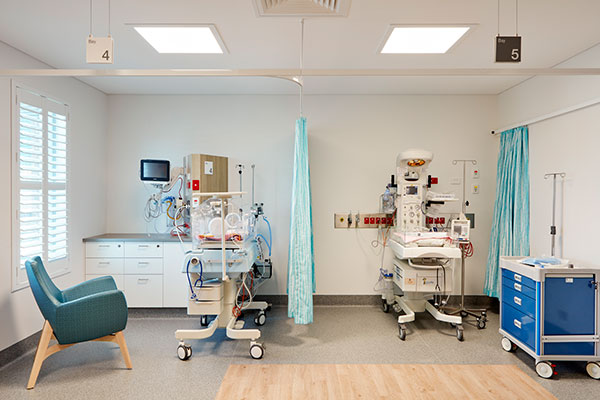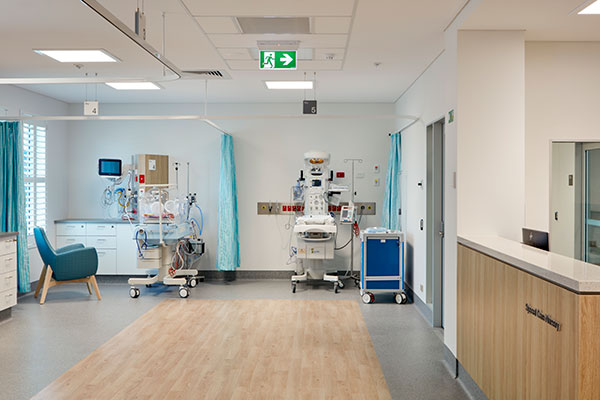Special Care Nursery
There are many reasons why a baby requires admission to a Special Care Nursery(SCN).They may have been born prematurely (before 37 completed weeks) or are unwell. This means that extra nursing & medical care is required and this extra care is provided in the Special Care Nursery at St Andrew’s Ipswich Private Hospital.
We understand the admission of your baby to the Special Care Nursery environment may generate concern and many questions. As the care and comfort of you and your baby are our primary concerns, we are pleased to provide important information on our Special Care Nursery Services.
About Us
The Special Care Nursery at St Andrew’s Ipswich Private Hospital is a Level 2 nursery that is able to provide specialised care for babies born from 32 weeks. The SCN staff are all highly qualified nurses and midwives who specialise in the care of babies requiring extended specialist care. Paediatricians are available and are on-call 24 hours a day.
The Special Care Nursery Environment
The Special Care Nursery will feel unfamiliar and some equipment will generate feelings of concern. In the event that you require the services provided by our Special Care Nursery, the staff will explain all equipment or procedures that may be involved in caring for your baby.

Monitoring
All newborn sick babies and preterm babies are monitored for many reasons.
Term: If a term baby is unwell we monitor all systems by observing heart rate, breathing rate and oxygen levels.
Preterm: The nervous system of a premature baby is immature - this includes their respiratory function. A monitor is used to keep a check on your baby’s heartbeat, breathing and oxygen levels. If a pre-term baby does not breathe or forgets to breathe, a monitor will alert the nursing staff to stimulate the baby to breathe. Usually a tickle on the foot or a gentle rub on their back is all that is required. This is expected in preterm babies.
Jaundice
Jaundice in newborn babies is a yellow colouration of the skin and whites of the eyes. Visible jaundice occurs in almost half newborn babies. The treatment for jaundice is phototherapy (UV light therapy).
Safe Sleeping
At St Andrew’s Ipswich Private Hospital we follow the Red Nose Safe Sleeping Guidelines (September 2016). All the babies, once in an open cot are placed on their backs to sleep. You will notice all the babies in incubators may lie on their stomach or side as well as on their back. This is for medical reasons.
Caring for your Baby
The Special Care Nursery Staff encourage you to participate in all aspects of your baby’s care. You will be shown how to:
- take your baby’s temperature
- change your baby’s nappy
- clean your baby’s eyes and mouth
- establish breast feeding or the feeding method of your choice
Parental involvement is essential however, caring for yourself is also important. Like your baby, you need extra sleep, a healthy diet and plenty of fluids.
Touching your Baby
- Hold your baby’s hand
- Stroke their face or body
- Rest your hand on their body whilst gently talking to them. They will recognise you and your partner’s voice
- Siblings can also be involved
We encourage Kangaroo cuddles. This is skin to skin contact between you and your baby.
Feeding your Baby
At St Andrew’s Ipswich Private Hospital we recognise that Mother’s breast milk is the best for all babies, in particularly the sick or preterm baby. Our Special Care Nursery Staff promote and encourage breast feeding, however we also support your choice of feeding.
Your baby may need gavage (tube) feeding before they are able to progress to full breast or bottle-feeding. While your baby is still on tube feeding we encourage non-nutritive sucking on a dummy or nuzzling at the breast during the tube feed.
Your paediatrician and the clinical staff will discuss your baby’s daily feeding requirements with you. Lactation consultants are available to assist you with feeding during your Special Care Nursery admission and on discharge.

Visiting
- Parents have unrestricted visiting hours day and night
- Please ensure you switch off your mobile phone before entering the special care nursery
- Due to babies’ increased risk of infection, limited and strict visiting is implemented to minimise this risk
- Visitors are limited to TWO people per visit for short visits only (i.e. 10 minutes)
- Visitors are limited to family, friends and siblings
- Visiting children are limited to siblings only and must be under parental control at all times to ensure that they do not touch any equipment or other baby’s cots. Small children should be carried. As you would appreciate unwell children are not permitted in the special care nursery so please make other arrangements for their care if you are at all concerned they may not be well
- Occasionally you may be asked to leave the Nursery whilst a procedure on another baby is in progress.
- All visitors must wash their hands thoroughly on entry and exit to the Nursery
- For the safety of all babies in the Nursery, any visitor with an infection (e.g. cold, conjunctivitis, gastroenteritis) or recent contact with chicken pox will not be permitted to visit. If unsure, please check with Nursery staff prior to visiting
- Visitors are restricted to visiting the baby they have come to visit and are definitely not to handle, touch or request information about any other babies
- Parental consent must be obtained by visitors to visit your baby in your absence
Hand Hygiene
As Special Care Nursery babies are vulnerable to infection, it is important to reduce this risk. Hands carry bacteria (germs) on the skin. Bacteria are found on every surface you touch and can cause an infection in newborn babies, especially sick babies as their defence systems for fighting infection are not fully developed. All visitors including parents are asked to wash their hands on entry to the nursery.
You will notice hand gel at the end of each cot /isolette. It is important that this is used prior to all contact with your baby.
We also request that your visitors limit touching/handling of your baby. Unwell babies need as much rest as possible. Over handling can use up precious energy.
Survival Tips for SCN Parents
What happens on my day of discharge when my baby stays in Special Care Nursery?
The staff in SCN will:
- Give you containers and labels for your Expressed Breast Milk
- Give a phone number for the unit
- Talk to you about visiting your baby
- Give you advice on parking
Accept offers of help:
- Meals cooked for you by your friends or family
- Siblings to be baby sat
- Transport if following Caesarean